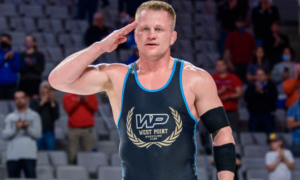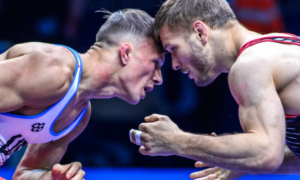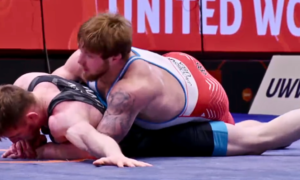Six-time National Team member Jon Anderson (87 kg, Army/WCAP) would likely have been a serious candidate to make the 2018 Senior World Team this coming June. Unfortunately for US Greco-Roman fans, his abilities on the mat pale in comparison to his responsibilities off of it.
Anderson, a Major in the United States Army and graduate of the West Point Academy, will be leaving for Afghanistan in a few weeks (or in that neighborhood — he can’t say definitively for obvious reasons) to begin a nine-month deployment. This trek to the Middle East will also not be Anderson’s first. In 2009, he served as part of Operation Iraqi Freedom and shortly thereafter was when he discovered the makings of a promising Greco-Roman career. It hasn’t worked out too badly. Anderson burst onto the scene for good at the 2012 Olympic Trials, coming away with a dramatic pin over former World Teamer Jake Fisher to claim third place, and by extension, his initial spot on the National Team. To say it’s impressive for a late-Greco-bloomer would be a massive understatement.
Since then, the 33-year-old has carved out a niche as perhaps the hardest-working and most energy-filled athlete in the sport. He never, ever slows down. Ever. Because of Anderson’s constant output, folks in and around Greco have dubbed him “Mr. Intensity”, as accurate of a moniker as there is.
His two most recent outings underscore this reputation. Anderson entered the 2017 Trials following a multi-month stay on the East Coast for TDY, or Temporary Duty. He was without regular training and the high-caliber partners who normally surround him at the WCAP training center near his home in Colorado Springs. It didn’t matter. Anderson gave eventual finalist Joe Rau (Minnesota Storm) all he could handle in the opening round before roughhousing his way to the bronze medal match where he overcame WCAP teammate Lucas Sheridan. And just over three months ago, Anderson put in another sparkling effort at the Dave Schultz Memorial, dominating Korea’s Park Je-Woo to pick up third.
So no, Jon Anderson is not even close to slowing down and when he alerted this writer to his service on the other side of the planet (and what remains a dangerous place to be), it was nothing but positivity. That’s just how the guy is, willing to embrace every situation. Of course, there is no mistaking how important this side of his career is to him (“I’m a soldier first,” he was quick to point out when we talked). There aren’t layers of mystery here: Anderson is a both a well-trained and natural-born leader who takes pride in being there for his country as well as his family.
Of course, in a sporting context, the timing isn’t fantastic. The Senior Greco-Roman season, despite its official launch months ago, is really just starting to unfold. There are new rules, overseas tours, the US Open, and of course, the World Team Trials. Anderson is jetting to Afghanistan knowing full well that he’ll be waving goodbye at another opportunity to make a Team. At this stage in his career, that can’t be easy to do. There are more important things in life than wrestling, for sure. Anderson understands that better than most. Even still, since this is what we do around here, lift up the voices of our sport in effort to tell their stories, getting Anderson’s perspective on his impending deployment and how it relates to his Greco-Roman career carried with it a high priority.
Jon Anderson — 87 kg, Army/WCAP
5PM: Before you found out you were headed to Afghanistan, what were your competitive plans outside of the Open and the Trials? We talked in the fall, you’re always looking for a shot to wrestle overseas, was there anything like that going on?
Jon Anderson: Yeah, we were looking at Denmark pretty closely, working with Coach (Matt) Lindland, and it kind of conflicted with the Armed Forces Championships anyway, so I might not have been able to go or I would have gone right after for some of the camp. That was kind of the plan, looking at that. I had to look at the (Army) career, I had an interview, and then I laid out the timeline.
You know, in the military, you hear a lot about sacrifice. A lot of soldiers have personal goals and plans, and obviously, that doesn’t come first in the Army. Your job as a soldier is to fight and win our nation’s wars and always be ready. Hearing it, once I found out what I was doing, it’s professionally very exciting. On the side of wrestling, it’s a shot to the gut for this year. But I’m going to stay in tip-top shape, train on my own, I did that last deployment, and I’m going to come back stronger than ever. I will be able to maintain personal and professional goals. But there are certain times when you have to fully invest in one thing over the other in order to achieve total balance in the end.
5PM: You look in the news and there are headlines lately about the US putting more troops in Afghanistan. I’d imagine this is all part of that?
Anderson: Yes, I think it aligns with what you’ve read in the papers or seen on TV, matching resources to our goals. That’s what the US strategy currently is and so, that means more troops, more equipment and maybe more resources. I’m not too sure on the details of it, but it is about winning the war. And the way you win is to equip, train, and fully empower the Afghan National Army and their police forces. It’s their country, but we’re going to see this thing out the right way and accomplish our mission. That is what it’s all about.
5PM: When you came back from Iraq some seven years or ago so now, did you expect that at some point in your career you’d be going back to that side of the world again?
JA: Yes, definitely, I knew it would come at some point. The thing I’ve always enjoyed about the military is that it is a little unpredictable in some ways. You can be creative with your career, you can be creative with your timeline, which I’ve done with the way I’ve balanced out my wrestling goals with the World Class Athletes Program while being an infantry officer. I’ve gone outside of the cookie-cutter solution per se, but I have been able to serve the country, honor my family, my faith, and really, just serve soldiers the entire time, which has been a blessing.
5PM: A year ago, you were piecing together your training for the most important tournament of the year, and it was absolutely one of the most impressive performances of that weekend. Then, when you jump ahead, you wrestled very well at Schultz with the new weights and weigh-ins, whatever. There appears to be momentum, right? Does that make any of this at all harder to take?
JA: No. Look, you’re the master of your destiny. You are in control of what you do and how you ultimately perform. You can have the most optimal training environment with every coach you could want, every resource from nutrition to sports psychology — everything — but, in the end, when you step on the mat and shake hands, it’s on your mind and have you have to execute. You can make the decision to let an obstacle hold you back from being at your best, or you can overcome and transform into something greater because of it. So to me, it’s the way you interpret things, the way you approach life.
I’ve been very fortunate and blessed to have a good training environment for the last several years and now, just like I did when I was TDY and got creative and trained on my own, I was in complete control of what I did. And going forward, I am going to do the same thing. During my Iraq deployment, we built a little dojo and we trained every night. After 12-15 hours of work, missions, or whatever it might have been, we usually had two or three hours to blow some steam off. We worked jiu jitsu, wrestling, muay Thai, and it was great and I got better. When I came back, I applied that to everything else I’ve done.
And I’m going to do the same thing in Afghanistan. I’m going to gather like-minded individuals and I’ll tell you, the soldiers who I’m working with at 2nd Brigade 4th Infantry Division, they are world class. They are top-notch soldiers in their fields of expertise and I’ve already run into some really good athletes and wrestlers. So, iron sharpens iron and I’m excited to see what the future holds.
5PM: It would seem you’re due home sometime in the late fall or thereabouts. Upon your arrival home, once you’re settled, will you be able to immediately resume your wrestling career?
JA: After deployment, I will still be working in 2nd Brigade for a little while and I’ll just train on my own. I’ll still be able to make some WCAP practices and a few practices at the OTC (Olympic Training Center), but I won’t be full-time like I was before a little bit longer past deployment. Sometime in that next year is when I’m looking into fully integrating and getting back to ramping up for 2019 and the 2020 Olympics. That’s the plan right now. The Army teaches us to be flexible, agile, and adaptive, so I have a few different courses of action and contingencies. But that is the general plan — get back, train on my own, compete on my own time, and then continue to serve in the 4th Infantry Division as a staff officer and shape the Army by training soldiers.
5PM: What are the similarities you encounter regarding teammates of yours in WCAP and the soldiers you are currently working with?
JA: I’ve been around world-class soldier-athletes on WCAP for the last several years, and those are individuals who know how to perform under pressure and can balance multiple difficult tasks. Going over to the 2nd Brigade Infantry Combat Team, the 2IBCT, when I showed up and had a little bit of time to assess who I was working with and what the unit was all about, I immediately got the sense that it was team and family atmosphere. All of the soldiers were disciplined, well-trained, ready to fight, and ready to accomplish any mission that I might have. Just like I did when I showed up to WCAP, which is step up my game to learn from the best, that’s what I’m doing now. I’m surrounded by very smart, very driven individuals, be them officers, non-commissioned officers, or soldiers. I feel like I’m learning from them and I am excited to contribute to our mission.
5PM: The new Greco rules, hopefully they’ll hold onto them and let them mature before they’re altered again. You have practiced at least with the new rules, I’m sure of it. What do you think, given your style?
Jon Anderson: Like I’ve said, when the rules changed last year and the year before, I’m pretty good at adapting and making the rules fit my plan. But officially, I like to smoke the strategy out of my opponents no matter what the ruleset is, so I’ll adapt no problem.
5PM: Yeah, but that’s the point. Here, you’ll have two minutes, which is over a minute longer than previously, that you have to work unencumbered. Given your level of aggression, this seems tailor-made for you.
JA: Oh, exactly. I can really focus on grinding my opponent down in the first two minutes and not be worried about an arbitrary passive call. It’s game time, let’s go into deepwater and see who can swim. I’m excited about that.

Anderson and family shortly after his win in the bronze medal round of the 2017 Dave Schultz Memorial in November. (Photo: Team Anderson)
5PM: As much as you’ll miss your family, I assume the one decent thing is that you’ll be able to touch base home and video chat or Facetime, there are a million ways to do that sort of thing. It isn’t like you have to wait in line at a pay phone bank.
JA: I plan on Facetiming as much as I can, and actually, writing letters home and receiving letters was great in Iraq and we’re going to do that again, just because that’s special in its own right. It is kind of a lost art you need to brush up on so you can look forward to mail coming in. But we’re going to connect, maybe not daily, but as much as we can.
Connection is key. Staying in touch with your family is going to make a stronger soldier and it will make me more effective in doing my job knowing my kids are doing my well, my wife is continuing to knock down doors and carrying the family. It will definitely help.
But it’s still not easy. It is going to be nine months away (from home), my kindergartner will be a first-grader when I get back, that kind of thing, that’s what you miss out on. Missing birthdays, my tenth anniversary…Facetime won’t replace those moments, but it’ll certainly bridge the gap as much as possible and I plan on utilizing that.
5PM: You have fans. Athletes have fans, you certainly do. I texted you this question, but why should fans not find this news disappointing?
JA: I’ll give you three reasons why: freedom, liberty, and justice for all. I think those are actually good reasons.
Freedom isn’t free. I joined the Army to defend our nation and I’m doing my job. I’m excited to contribute to our mission and to defend the freedoms that we all have, and that we’re trying to support overseas, as well. That is a God-given right we’re trying to fight for and I’m happy to do my part and be a part of team that is going over there. I’m on the away team for a little while, that’s all it is. And I’m just one of many people who sacrificed time from their families and their lives to contribute to the mission of the United States of America.
I’m proud to do it, and I am going to take the same mentality I take to the mat to every mission I get in Afghanistan. I’m going to make sure we do everything in our power to be successful and accomplish our mission, and win, which is what I do. It’s what I do every day on the mat in the past and it’s what I do as an officer in the Army, is help build the team, understand what we have to do, make the plan, and execute.
Follow Jon Anderson on Twitter and the Team Anderson Facebook page to keep up to date on his career and competitive schedule.
CLICK HERE TO DONATE TO THE USA GRECO-ROMAN PROGRAM
SUBSCRIBE TO THE FIVE POINT MOVE PODCAST
iTunes | Stitcher | Spreaker | Google Play Music | RSS


















